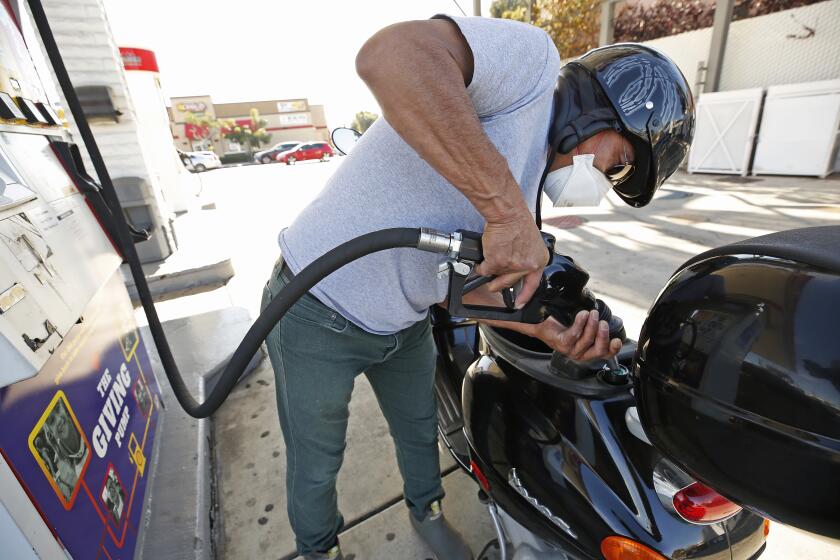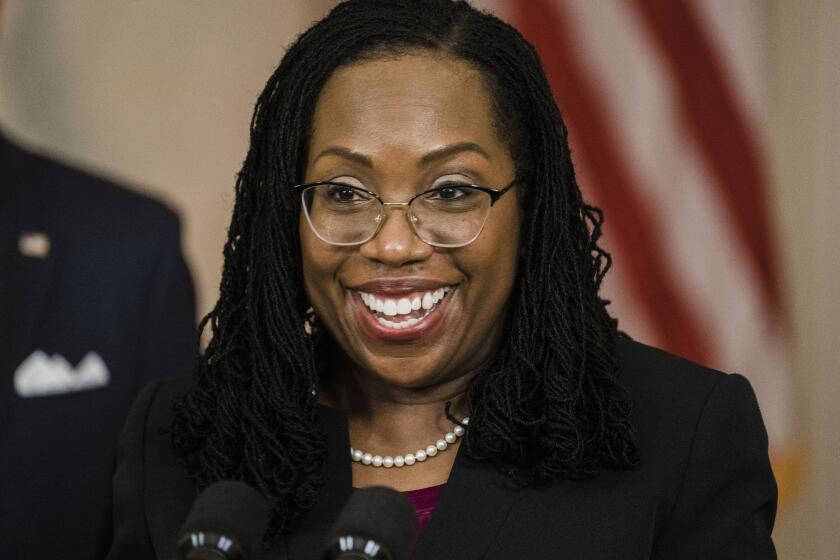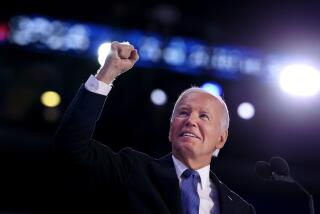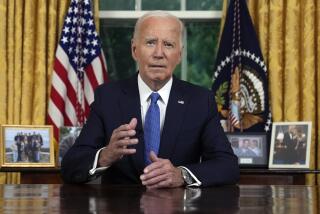The state of the union is anxious, but annual speech to Congress offers Biden an opportunity
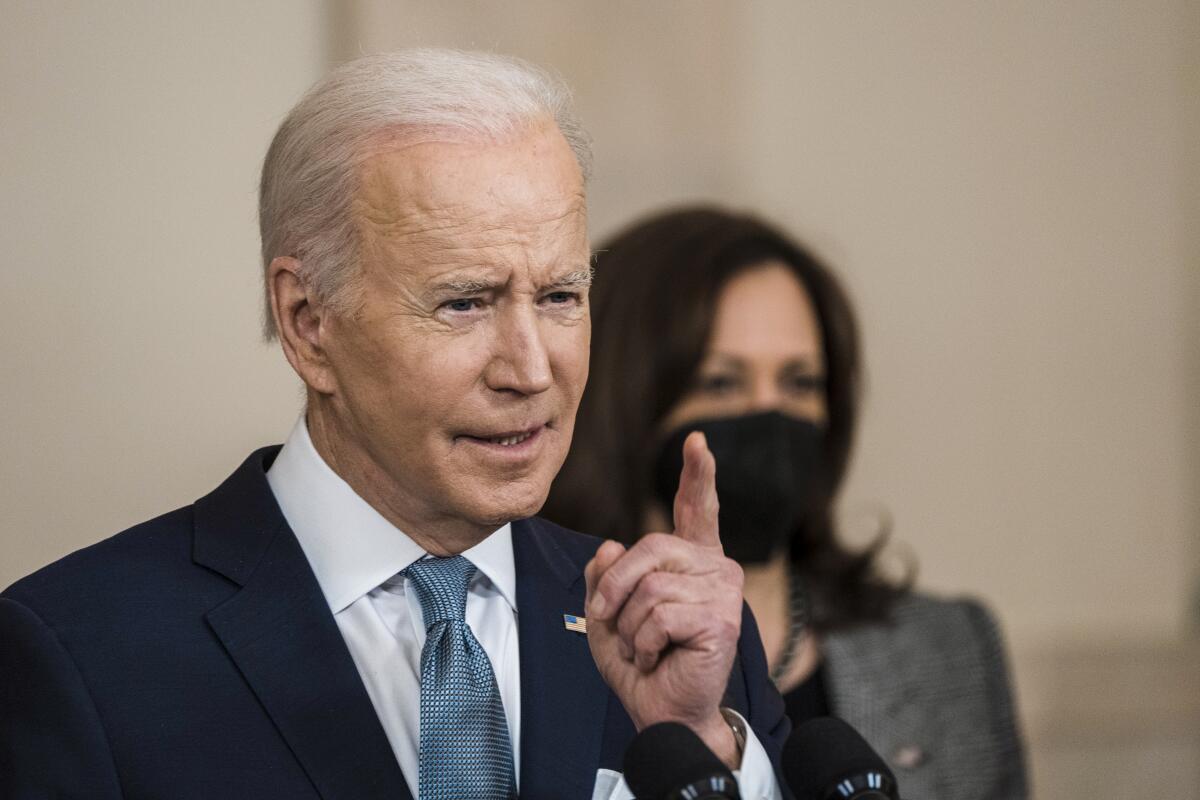
- Share via
WASHINGTON — President Biden took office 13 months ago vowing to halt the COVID-19 pandemic, improve the economy, soften America’s calcifying partisan division, restore faith in Washington’s leadership on the world stage and prove that democracies can function and deliver.
As he prepares for his first State of the Union address on Tuesday — at a moment of rising anxiety across the nation and the world — those endeavors remain works in progress, at best.
“No president in my memory has had so many crises dumped onto him in the first year as Biden has, and the speech has to be equal to that,” said Bob Shrum, a longtime Democratic speechwriter who aided President Clinton with his State of the Union addresses. “It’s his best chance and his best platform to try to define the Democratic Party and his presidency in a way that will have traction in the [November] midterms.”
Shrum said Biden would have to strike a careful balance in the speech. He needs to highlight his administration’s successes, Shrum said, but cannot strike a triumphalist tone.
“You have to say what people [will] believe,” Shrum continued. “They need a very careful framing that says, ‘We’ve achieved some important things, but there are some really important challenges that matter to people that we have to address.’ The key here is to not sound satisfied.”
Although the pandemic may be easing, leading the Centers for Disease Control and Prevention to lift most indoor mask requirements Friday, Biden can’t easily declare victory and repeat a mistake that had enormous political consequences. Seven months ago, he told the nation it had turned a corner in the pandemic, just before new coronavirus variants arrived and drove up COVID-19 caseloads, hospitalizations and deaths. The Delta and Omicron waves exhausted what little patience the country had left.
Biden also can’t easily celebrate surging economic growth. Despite record first-year gains in the job market, surging inflation has exacerbated the economic insecurity felt by millions of Americans.
And while he won passage of a bipartisan infrastructure package in October, the president’s other major domestic agenda item — an economic relief package for working families that also included his administration’s main attempt to combat climate change — has stalled. Biden has cast the plan as the best way to ensure America’s relevance in the world economy while protecting the environment. But those Rooseveltian ambitions have been deflated by the realities of Democrats’ razor-thin congressional majorities, upsetting his party’s most ardent supporters ahead of November’s midterm elections.
With the American public largely preoccupied with domestic matters and his approval rating in the low 40s, Biden must speak to Americans’ economic concerns while offering some reassurance that things are improving.
“The president will be ridiculed if he says the state of the union is strong, but he doesn’t have to say it’s terrible,” said Timothy Naftali, a presidential historian at New York University. “They want honesty, but they also want hope.”
Dan Sena, a Democratic operative and former executive director of the Democratic Congressional Campaign Committee, said that Biden “has to acknowledge the public’s fears and concerns and the work regular people have done to move forward. And that will make the audience more receptive to hearing about what he and Democrats have done.”
Russian President Vladimir Putin’s advances in Ukraine have put President Biden and the U.S. economy between a rock and a hard place.
His mixed success in curbing the pandemic and passing his legislative agenda has been further complicated by Russia’s invasion of Ukraine last week. The unprovoked attack threatens global energy markets and the security of Europe and the West, and has challenged Biden’s proposition that democracies are destined to triumph over autocracies.
“If you’re focusing on the domestic situation, it’s pretty hard to do an upbeat talk,” said Douglas Brinkley, a presidential historian at Rice University. “And if you’re focusing on foreign affairs, it’s hard to do an upbeat talk.”
Even so, Russia’s war in Ukraine offers Biden an opportunity, in Brinkley’s view, to convince Americans of the importance of a united transatlantic alliance and to emphasize that he brought allies together to stand against Russian President Vladimir Putin’s assault.
“It’s a key moment to take the stage as the global leader who is going to halt authoritarianism by building up our armed forces,” Brinkley said. “He somehow has to make people really feel like ‘the USA is back,’ that democracy is eternal.”
With broad bipartisan support in the U.S. coalescing behind Ukraine in its fight against Russia, the war represents Biden’s best chance to garner strong applause from both sides of the House chamber.
While not known for soaring oratory, Biden, like every president, will use the speech “to outline his vision and agenda,” said John Anzalone, a Democratic pollster who worked on Biden’s 2020 campaign. “Joe Biden does a good job on big, important speeches of being really clear about what his vision and agenda is, and also what he himself believes and values,” he said.
Biden, aides say, has been reviewing drafts of the speech for several weeks, squeezing prep sessions into days already jam-packed with meetings about Ukraine, his nomination on Friday of the first Black woman to the Supreme Court, and travel aimed at promoting the benefits of the infrastructure law.
In the address, he is likely to make a case that Congress should pass key elements of his agenda, including subsidies for child care and tax breaks to incentivize cleaner energy markets. But raising expectations on policies that are no sure bet to become law carries some risk.
Sena, the Democratic operative, said it would be more helpful to Democrats on the ballot in November for Biden to emphasize what he has already achieved, namely the relief package enacted nearly a year ago that has caused a drop in unemployment, and passage of the bipartisan infrastructure law.
“Giving campaigns the ability to plant their feet and lean into their accomplishments and what they’ve done to deliver in making people’s lives easier, that should be the goal,” Sena said.
If confirmed, Judge Ketanji Brown Jackson would be the first Black woman to serve as a justice on the high court.
By touting his nomination of Judge Ketanji Brown Jackson to the Supreme Court, Biden can also lean into the history she would make as the first Black female justice while reminding Democrats that holding on to the Senate and the presidency would allow him to further influence the trajectory of the judiciary.
Jennifer Palmieri, who served as President Obama’s White House communications director, sees Biden tying together the Supreme Court, his domestic agenda and his foreign policy goals under the broader theme of working to restore the vitality of American and global democracy — an aim that the war in Ukraine has cast in sharper relief.
“This is the hand they have been dealt,” said Palmieri, asserting that aides no doubt “want him talking about how he’s going to combat inflation.”
Biden should “lean into the important historical moment [he’s] in,” she added. “It may be harder to have a more traditional, grounded policy agenda break through this year, but if I were them, I’d say this is a moment for the president of the United States to rally the country to a very big moment and challenge for the country and the world.
“And unifying around this one fight is going to help to build credibility for others.”
More to Read
Get the L.A. Times Politics newsletter
Deeply reported insights into legislation, politics and policy from Sacramento, Washington and beyond. In your inbox three times per week.
You may occasionally receive promotional content from the Los Angeles Times.
